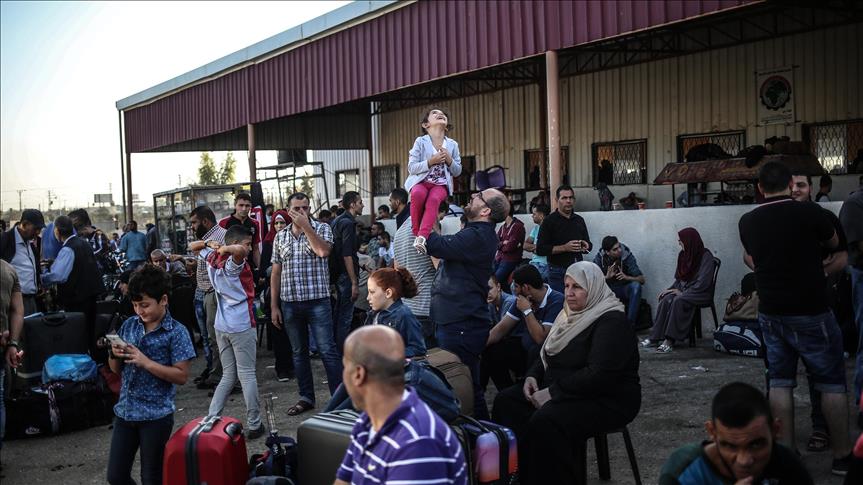
Egyptian authorities on Sunday reopened the Rafah border crossing with the Gaza Strip in both directions.
Passengers gathered since early morning to cross into and out of the Gaza Strip, according to an Anadolu Agency reporter.
There was no comment from Palestinian or Egyptian authorities on the report.
Egypt closed the crossing last Monday until further notice, security sources said, adding the closure was made for security reasons following an escalation of hostilities on Saturday between Israel and Hamas.

However, the crossing was opened two days later in one direction to allow travelers into the Palestinian territory.
The Rafah border terminal is the only gateway to Palestinians in Gaza to the outside world that is not controlled by Israel, which has imposed a crippling blockade on Gaza since 2007.
According to the Palestinian Interior Ministry in Gaza, there are more than 27,000 people registered as needing to travel through the Rafah Crossing. The Egyptian authorities allow only 350 people to get through the public hall and about 100 through the VIP hall daily when the crossing is open (there are frequent closures). Those needing to travel need months to get through Rafah.
“The number of people who want to travel is rising all the time,” explained Iyad Al-Bozom, a spokesman for the Interior Ministry. “We have asked the Egyptians to increase the daily quota of people allowed through.” The request has obviously fallen on deaf ears.
Five years ago, the Egyptian army established Ya Hala Company for Tourism and Travel. It organizes VIP travel for Gaza’s Palestinians who can afford to pay. In the beginning, it worked behind the scenes. Following the 2018 Great March of Return protests and the understandings reached between Israel, Egypt and the Palestinian resistance groups in Gaza, the crossing opened regularly and this company started to work openly, reported Middle East Monitor.
It struck deals with Gaza-based travel companies which started to promote its services. The Egyptian authorities built a special immigration hall for its customers.
Hatem, who refused to give his second name, is an agent for a Gaza-based travel and tourism company. “We register between 100 and 150 VIP passengers a day,” he said. “We carry out security checks on each one for $100. If the person is not blacklisted, they will pay between $400 and $5,000 for passage through the Egyptian side of the crossing and a taxi to Cairo,” reported MEM.
Such VIPs are exempt from further security checks and taxis take them from the crossing directly to Cairo. They do not stop at any of the military checkpoints and their luggage is not inspected. The journey to Cairo takes only six hours; seven or eight at most. “All the money we charge goes to Egyptian companies, most likely run by the army,” Hatem pointed out. “We only get some commission.”



